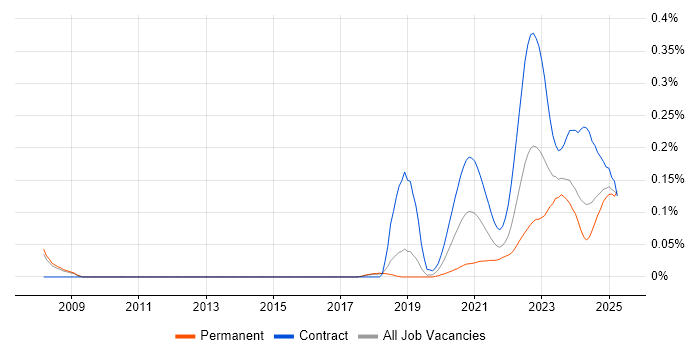Front Office Developer
UK > Work from Home
The median Front Office Developer salary for remote or hybrid work is £110,000 per year, according to job vacancies posted during the 6 months leading to 1 May 2025.
The table below provides salary benchmarking and summary statistics, comparing them to the same period in the previous two years.
|
|
6 months to
1 May 2025 |
Same period 2024 |
Same period 2023 |
| Rank |
375 |
571 |
632 |
| Rank change year-on-year |
+196 |
+61 |
+197 |
| Permanent jobs requiring a Front Office Developer |
22 |
21 |
41 |
| As % of all permanent jobs with a WFH option |
0.15% |
0.062% |
0.096% |
| As % of the Job Titles category |
0.16% |
0.065% |
0.100% |
| Number of salaries quoted |
18 |
20 |
38 |
| 10th Percentile |
£74,625 |
£54,450 |
£78,000 |
| 25th Percentile |
£78,125 |
£59,063 |
£84,063 |
| Median annual salary (50th Percentile) |
£110,000 |
£123,750 |
£97,500 |
| Median % change year-on-year |
-11.11% |
+26.92% |
-11.36% |
| 75th Percentile |
£162,500 |
£150,000 |
£111,000 |
| 90th Percentile |
- |
- |
£132,500 |
| UK median annual salary |
£110,000 |
£132,500 |
£105,000 |
| % change year-on-year |
-16.98% |
+26.19% |
+5.00% |
For comparison with the information above, the following table provides summary statistics for all permanent IT job vacancies with WFH or hybrid options. Most job vacancies include a discernible job title that can be normalized. As such, the figures in the second row provide an indication of the number of permanent jobs in our overall sample.
| Permanent vacancies in Work from Home with a recognized job title |
13,554 |
32,482 |
41,080 |
| % of permanent jobs with a recognized job title |
90.64% |
95.99% |
96.08% |
| Number of salaries quoted |
9,860 |
24,960 |
29,208 |
| 10th Percentile |
£30,000 |
£33,000 |
£36,500 |
| 25th Percentile |
£43,750 |
£42,500 |
£47,250 |
| Median annual salary (50th Percentile) |
£60,000 |
£56,000 |
£62,500 |
| Median % change year-on-year |
+7.14% |
-10.40% |
+4.17% |
| 75th Percentile |
£77,500 |
£75,000 |
£81,250 |
| 90th Percentile |
£100,000 |
£92,500 |
£100,000 |
| UK median annual salary |
£57,500 |
£52,777 |
£60,000 |
| % change year-on-year |
+8.95% |
-12.04% |
- |

